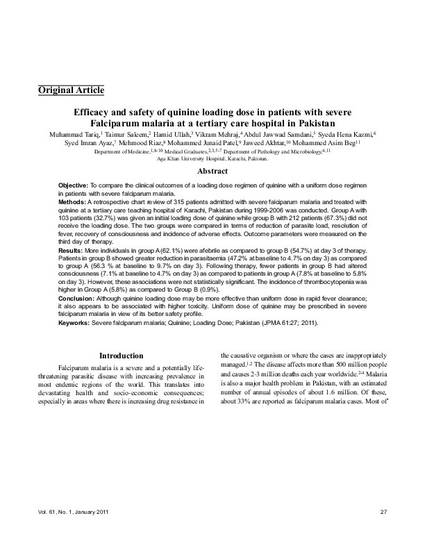
OBJECTIVE: To compare the clinical outcomes of a loading dose regimen of quinine with a uniform dose regimen in patients with severe falciparum malaria.
METHODS: A retrospective chart review of 315 patients admitted with severe falciparum malaria and treated with quinine at a tertiary care teaching hospital of Karachi, Pakistan during 1999-2006 was conducted. Group A with 103 patients (32.7%) was given an initial loading dose of quinine while group B with 212 patients (67.3%) did not receive the loading dose. The two groups were compared in terms of reduction of parasite load, resolution of fever, recovery of consciousness and incidence of adverse effects. Outcome parameters were measured on the third day of therapy.
RESULTS: More individuals in group A (62.1%) were afebrile as compared to group B (54.7%) at day 3 of therapy. Patients in group B showed greater reduction in parasitaemia (47.2% at baseline to 4.7% on day 3) as compared to group A (56.3 % at baseline to 9.7% on day 3). Following therapy, fewer patients in group B had altered consciousness (7.1% at baseline to 4.7% on day 3) as compared to patients in group A (7.8% at baseline to 5.8% on day 3). However, these associations were not statistically significant. The incidence of thrombocytopenia was higher in Group A (5.8%) as compared to Group B (0.9%).
CONCLUSION: Although quinine loading dose may be more effective than uniform dose in rapid fever clearance; it also appears to be associated with higher toxicity. Uniform dose of quinine may be prescribed in severe falciparum malaria in view of its better safety profile.
Available at: http://works.bepress.com/muhammad_tariq/17/
